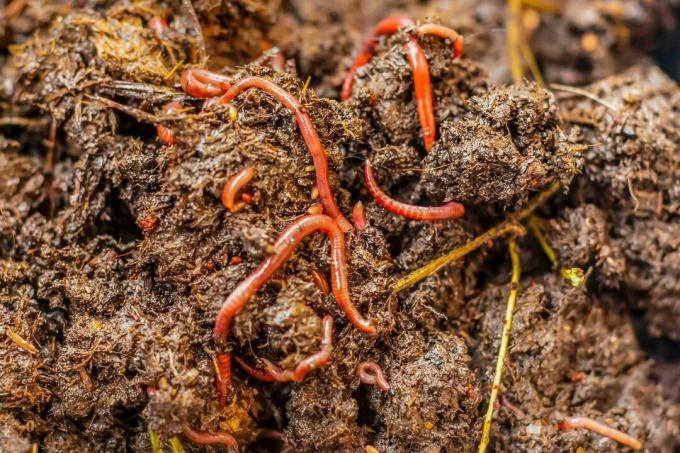Unlike organic fertilizer, artificial fertilizer is made from fossil minerals and atmospheric nitrogen. We show what alternatives there are.

How do artificial fertilizers fit into the naturalness of living and growing gardens? The term delimits the chemical-industrially produced nutrient mixtures clearly compared to the natural fertilization - and rightly so, because artificial fertilizers and natural fertilizers are ultimately effective differently.
Here you can find out exactly what artificial fertilizers are, when they can be used sensibly and where their disadvantages lie. We will then name fertilizer alternatives.
What is artificial fertilizer?
are artificial fertilizers mineral fertilizersthat are manufactured or processed using chemical and industrial processes. The raw materials used come from fossil deposits - only the nitrogen has to be produced in the Haber-Bosch process from atmospheric nitrogen (N
2) are synthesized. The individual nutrients have crystallized into salts that redissolve in the soil water when they are applied. After the fertilizer granules have been dissolved, the nutrient ions can be absorbed by plants and used by soil organisms or transformed, bound to soil particles by electrical forces of attraction or washed out downwards will. Because of their fast action and high concentration, artificial fertilizers are able to remedy acute deficiencies in plant nutrition. So if a plant with a severe deficiency needs to be taken care of immediately, mineral fertilizers or fertilizers can be used liquid fertilizers make sense.Disadvantages of artificial fertilizers
Artificial fertilizers are attractive to many consumers at first glance, not least because of their low price. However, what should be considered: The cheap pricing of artificial fertilizers is only possible at the expense of the environment and at the expense of your garden. Because the production of artificial fertilizers consumes large amounts of energy, it exploits finite fossil deposits, destroys landscapes and pollutes water. The Haber-Bosch process for synthesizing nitrogen compounds from atmospheric nitrogen is so energy-intensive that it is only worthwhile if electricity prices are extremely low. And, of course, electricity can only be had so cheaply at the expense of the environment: coal and nuclear power make it possible.

As more permanent garden fertilizer Unfortunately, an artificial fertilizer is of little use: If used alone, it leads to a reduction in all soil qualities in the long term. Water and nutrient storage decrease, soil life becomes impoverished, humus is degraded, which also impairs aeration, loosening and root penetration. Soil fertility falls because the soil lacks the essentials. In addition, if used incorrectly, it can lead to leaching, over-fertilization and changes in the soil pH value, which is crucial for the nutrient uptake of the plants.
Notice: Some of the world's phosphate deposits are contaminated with uranium or cadmium. These are not contained in high-quality mineral fertilizers - in Germany there are protective limit values for them. However, the deposits for uncontaminated phosphates are scarce. Learn more about how here heavy metals in fertilizers can appear.
Alternatives to artificial fertilizers
The alternatives to artificial fertilizers are fertilizers that do not exclude the natural processes for maintaining soil performance: Organic Fertilizers or organo-mineral fertilizers contain nutrients in organically bound form. Of course, this also includes homemade fertilizer such as compost, horse manure, green manure or bokashi. If you buy primarily organic fertilizers, it is basically dried, crushed material of animal or plant origin, the nutrient content of which is precisely known and which may have been expanded with some mineral additives to increase the speed of action or the nutrient ratio of the raw materials to the needs of the fertilized plants to adjust. Biologically active components such as bacterial or fungal spores of useful microorganisms, such as mycorrhizae, are not unusual components. The advantages are obvious: By introducing carbon-rich structural material, the soil-forming organisms in the subsoil are nourished and have "building material" for humic soil crumbs. Their activity and humus formation loosens the soil, stores water and nutrients efficiently and can pass them on to the plants growing in the soil when needed.

Notice: Some soil-dwelling microorganisms – both fungi and bacteria, archaea, nematodes and insects - are in close contact with the root, sometimes even in symbiotic relationships. For plants, their presence promotes growth and vitality.
At Plantura, we have primarily developed organic fertilizers without animal additives that you can use gardening sustainably be able. the Plantura organic fertilizer are organically produced, are safe for nature and the user and provide both major and trace nutrients in appropriate compositions for flower, hydrangeas, roses or tomatoes and vegetables. Our Plantura organic universal fertilizer and the Organic soil activator can be used in a variety of ways in the garden. The purely organic Plantura Organic autumn lawn fertilizer winterizes your lawn and strengthens it for the coming year, while our primarily organic Plantura Organic Lawn Fertilizer Your lawn is optimally supplied with all nutrients in spring and summer while protecting the environment. You can find more about our Plantura product family in our shop.
